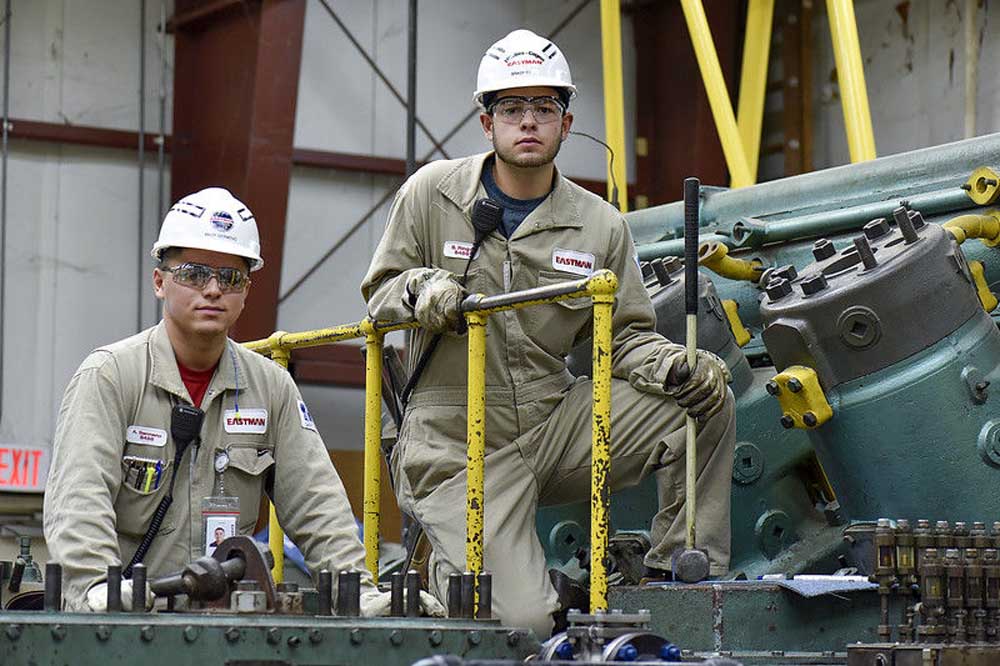Tyler Junior College power plant technology students get hands-on experience in summer internship
Published 12:41 am Monday, August 8, 2016

- Andy Sermeno, left, and Brady Ringo pose atop a massive piece of equipment on Friday, July 29, 2016, at the Eastman Chemical Co. training facility in Longview. The pair are students in the Power Plant Technology program at the Tyler Junior College West Campus in Tyler serving summer internships at the chemical plant nearby. Andrew D. Brosig/Tyler Morning Telegraph via AP
Tyler Junior College’s power plant technology training program, the only one in the state, sends students out to serve summer internships to gain industrial experience.
While serving an internship at Eastman Chemical Co. in Longview, Andy Sermeno, 20, of Mount Pleasant, said he has learned that a job in the field will mean “every day is different and you are always going to learn something every day.”
Sermeno said he likes the field because, “instead of doing a lot of physical work, it’s more about knowing what to do. I would rather do something with my mind than my body.”
Sermeno said he has learned about the equipment at Eastman Chemical and gained hands-on experience and how to identify and prevent potential hazards.
“You know how the equipment works and sounds. If the equipment is making a little noise and you let it pass and don’t tell the supervisor, the action could affect the whole plant,” he said, adding he is getting a good overview of the jobs available.
The internship, he said, is like a three-month job interview. He hopes there will be a job waiting for him when he graduates.
Brady Ringo-Carpenter, 19, of Lindale, who is also doing an internship at Eastman Chemical, said the industrial setting interests him. He hopes to get a job as a power plant operator and maybe later earn an engineering degree.
An as intern, he said, his role is to shadow or serve as an apprentice and work on equipment if a nearby supervisor gives permission.
The internship, Ringo-Carpenter said, “takes everything I’ve learned in school and allows me to apply it and see it in person at a real plant. It’s not just simulations or theory. I think that’s where you learn the most is when you are seeing it and actually doing it.”
Ringo-Carpenter said he enjoys being able to work with different pieces of equipment and doing something different every day. Another benefit, he said, is that he gets to see how much good money someone can make in the industry. Interns make $14 to $20 an hour, he said.
Starting salaries for graduates of the power plant technology program range from about $39,000 to $56,000 per year.
Students participate in a summer internship following the fall and spring semester of their first year of training, then return to college for two more semesters. Students who do not do an internship take a welding course. Graduates earn a two-year associate of applied science degree in power plant technology.
“The internship is the greatest opportunity a young man or woman can have,” said David “Link” Worthen, professor and program coordinator.
TJC’s goal is for students to do so well during the internship that the company where they are an intern “will love them and have a job open for them when they graduate,” Worthen said.
Students not only have to do well in the internship to earn a job, but also must do well in class to receive recommendations from TJC professors, Worthen said.
“I tell students they are in a two-year job interview. They have to pass my criteria and other professor’s criteria or they won’t get through the program and we sure won’t recommend them,” Worthen said.
Once they start working, they will be known as power plant operators and industrial maintenance workers. Graduates take different career paths, working for food processors, chemical companies, power generation companies and electrical distribution companies.
Besides Eastman Chemical, places where power plant students are doing an internship include Oncor, Sanderson Farms and Exelon.
There is a big demand for graduates of the power plant technology program because baby boomers are retiring, Worthen said, and companies are “hungry” for skilled mechanics and people with a good industrial base knowledge of the industry.
During the regular school year, students attend classes from 8 a.m. to noon Monday through Thursday. Normally, they take two courses at a time during two eight-week semesters in the fall and two in the spring.
They are trained in mechanical skills, electrical skills and instrumentation and controls.
“We teach disciplined workplace values for an industrial environment,” Worthen said.
Students are required to show up for class on time and are dropped if they do not meet TJC’s policy for students to attend class 90 percent of the time. They are not allowed to wear shorts and sandals, but are required to wear shirts with sleeves, long pants and closed steel-toed shoes.
Currently, the youngest student is 18 and the oldest is in his 50s, with all ages in between.
Not all graduates go to work in power plants. They are also in demand in the industrial maintenance field. For instance, Eastman Chemical does not make electricity, but needs workers with the skills that the TJC program teaches to operate or maintain equipment.
Because of what is taught and the industry grade lab equipment the TJC program has, graduates are ready to start work on Day 1 and do not need to go through training after they are employed, Worthen said.
The TJC power plant technology program started eight to 10 years ago on the college’s west campus with Luminant, the biggest electricity provider in Texas, providing instructors for training its employees.
Due to financial restructuring at Luminant, the company still brings in its employees for training, but TJC professors conduct classes and training and the program is strictly a TJC operation.
Twitter: @Betty_TMT






